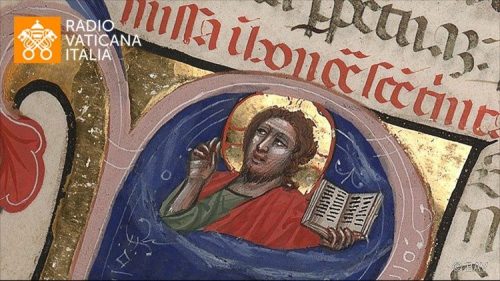READING OF THE DAY
First Reading from the Book of the Prophet Malachi
MAL 3:1-4
Thus says the Lord God:
Lo, I am sending my messenger
to prepare the way before me;
And suddenly there will come to the temple
the Lord whom you seek,
And the messenger of the covenant whom you desire.
Yes, he is coming, says the Lord of hosts.
But who will endure the day of his coming?
And who can stand when he appears?
For he is like the refiner’s fire,
or like the fuller’s lye.
He will sit refining and purifying silver,
and he will purify the sons of Levi,
Refining them like gold or like silver
that they may offer due sacrifice to the Lord.
Then the sacrifice of Judah and Jerusalem
will please the Lord,
as in the days of old, as in years gone by.
Second Reading
Second Reading from the Letter to the Hebrews
HEB 2:14-18
Since the children share in blood and flesh,
Jesus likewise shared in them,
that through death he might destroy the one
who has the power of death, that is, the Devil,
and free those who through fear of death
had been subject to slavery all their life.
Surely he did not help angels
but rather the descendants of Abraham;
therefore, he had to become like his brothers and sisters
in every way,
that he might be a merciful and faithful high priest before God
to expiate the sins of the people.
Because he himself was tested through what he suffered,
he is able to help those who are being tested.
GOSPEL OF THE DAY
From the Gospel according to Luke
LK 2:22-40
When the days were completed for their purification
according to the law of Moses,
Mary and Joseph took Jesus up to Jerusalem
to present him to the Lord,
just as it is written in the law of the Lord,
Every male that opens the womb shall be consecrated to the Lord,
and to offer the sacrifice of
a pair of turtledoves or two young pigeons,
in accordance with the dictate in the law of the Lord.
Now there was a man in Jerusalem whose name was Simeon.
This man was righteous and devout,
awaiting the consolation of Israel,
and the Holy Spirit was upon him.
It had been revealed to him by the Holy Spirit
that he should not see death
before he had seen the Christ of the Lord.
He came in the Spirit into the temple;
and when the parents brought in the child Jesus
to perform the custom of the law in regard to him,
he took him into his arms and blessed God, saying:
“Now, Master, you may let your servant go
in peace, according to your word,
for my eyes have seen your salvation,
which you prepared in the sight of all the peoples:
a light for revelation to the Gentiles,
and glory for your people Israel.”
The child’s father and mother were amazed at what was said about him;
and Simeon blessed them and said to Mary his mother,
“Behold, this child is destined
for the fall and rise of many in Israel,
and to be a sign that will be contradicted
Band you yourself a sword will pierceB
so that the thoughts of many hearts may be revealed.”
There was also a prophetess, Anna,
the daughter of Phanuel, of the tribe of Asher.
She was advanced in years,
having lived seven years with her husband after her marriage,
and then as a widow until she was eighty-four.
She never left the temple,
but worshiped night and day with fasting and prayer.
And coming forward at that very time,
she gave thanks to God and spoke about the child
to all who were awaiting the redemption of Jerusalem.
When they had fulfilled all the prescriptions
of the law of the Lord,
they returned to Galilee, to their own town of Nazareth.
The child grew and became strong, filled with wisdom;
and the favor of God was upon him.
WORDS OF THE HOLY FATHER
Before our eyes is a simple, humble and great fact: Mary and Joseph take Jesus to the temple of Jerusalem. He is a child like so many, like all, but he is unique: he is the Only Begotten who came for all. This Child has brought us the mercy and tenderness of God: Jesus is the face of the Father’s mercy. This is the icon that the Gospel offers us at the end of the Year of Consecrated Life, a year lived out with so much enthusiasm. Like a river, it is now flowing into the sea of mercy, in this immense mystery of love that we are experiencing with the Extraordinary Jubilee.
Today’s celebration, especially in the East, is called the feast of the encounter. Essentially, in the Gospel that has been proclaimed, we see various encounters (cf. Lk 2:22-40). In the temple Jesus comes to meet us and we go to meet him. We contemplate the encounter with the elderly Simeon, who represents Israel’s faithful anticipation and the heartfelt jubilation for the fulfillment of the ancient promises. We also admire the encounter with the elderly prophetess Anna who, in seeing the Child, exults in joy and praises God. Simeon and Anna are the anticipation and the prophecy, Jesus is the novelty and the fulfillment: he is presented to us as the perennial surprise of God; concentrated in this Child born for all is the past, made of memory and of promise, and the future, full of hope.
We can see in this the beginning of consecrated life. Consecrated men and women are called first and foremost to be men and women of encounter. Indeed, the vocation does not originate from a plan we have designed “on the drawing board”, but from a grace of the Lord which touches us, through a life-changing encounter. Those who truly encounter Jesus cannot remain the same as before. He is the novelty that makes all things new. Those who experience this encounter become witnesses and make the encounter possible for others; they also promote the culture of encounter, avoiding the self-referentiality that makes us stay closed off within ourselves.
The passage of the Letter to the Hebrews which we heard reminds us that in order to encounter us, Jesus did not hesitate to share our human condition: “Since therefore the children share in flesh and blood, he himself likewise partook of the same nature” (2:14). Jesus did not save us “from the outside”, he did not remain outside of our drama, but wanted to share our life. Consecrated men and women are called to be a tangible and prophetic sign of this closeness of God, of this sharing in the condition of frailty, of sin and of the wounds of today’s mankind.
All forms of consecrated life, each according to its characteristics, are called to be in a permanent state of mission, sharing “the joys and the hopes, the griefs and the anxieties of the men of this age, especially those who are poor or in any way afflicted” (Gaudium et Spes, n. 1). The Gospel also tells us that “his father and his mother marvelled at what was said about him” (Lk 2:33). Joseph and Mary safeguard the astonishment over this encounter full of light and hope for all peoples. We too, as Christians and as consecrated people, are guardians of astonishment. An astonishment which requires ongoing renewal; woe to routine in spiritual life; woe to the crystalization of our charisms in an abstract document: the founders’ charisms — as I have said at other times — are not to be sealed in a bottle, they are not museum pieces. Our founders were moved by the Spirit and were not afraid to soil their hands with everyday life, with the problems of the people, courageously moving along the geographical and existential peripheries. They did not halt in the face of obstacles and the misunderstandings of others, because they kept in their heart the astonishment over the encounter with Christ. They did not tame the grace of the Gospel; they always had in their heart a healthy apprehension for the Lord, a heartrending desire to bring him to others, as Mary and Joseph did in the temple. We too are called today to make prophetic and courageous choices.
Lastly, through the encounter with Jesus and through the gift of the vocation to consecrated life we learn from today’s celebration to experience gratitude. Thanking, giving thanks: the Eucharist. How beautiful it is when we encounter the happy faces of consecrated people, perhaps already advanced in years like Simeon or Anna, content and full of gratitude for their own vocation. This is a word that can summarize all that we have experienced in this Year of Consecrated Life: gratitude for the gift of the Holy Spirit, who always enlivens the Church through various charisms.
The Gospel concludes with this expression: “the child grew and became strong, filled with wisdom; and the favour of God was upon him” (v. 40). May the Lord Jesus, through the maternal intercession of Mary, grow in us, and increase in each person the desire for encounter, the safekeeping of the astonishment and the joy of gratitude. Then others will be attracted by his light, and they will be able to encounter the Father’s mercy.
(Gospel, 2 February 2016)

